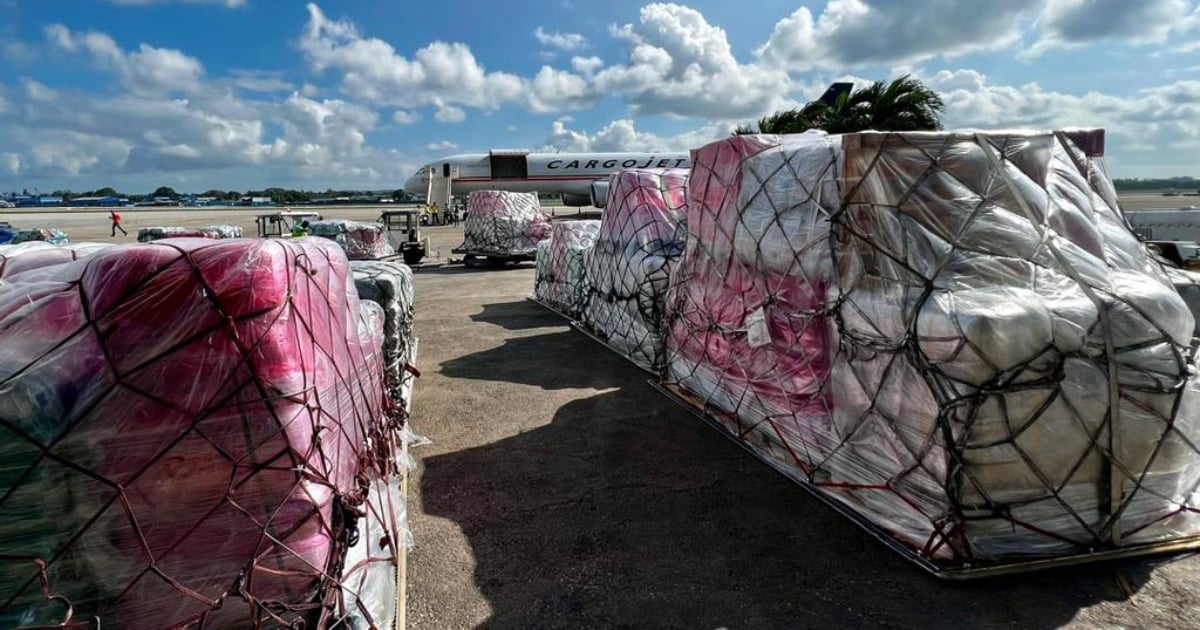
The government of Spain donated 9.3 tons of humanitarian aid materials to Cuba for those affected by Hurricane Oscar, which struck the eastern region of the country in late October, official sources reported.
The Spanish Agency for International Cooperation for Development (AECID), affiliated with the Ministry of Foreign Affairs of the European country, announced on Wednesday that the aid includes 70 tents, 1,000 mosquito nets, and 227 cooking sets, among other supplies, with a total value of $56,000, according to a report from the news agency EFE.
The donation adds to the 94 tons of essential supplies delivered to the government of Cuba in recent days by the United Nations (UN) and the European Union (EU) to support those affected by Hurricane Oscar in Guantánamo, the province hardest hit by the weather phenomenon on October 20 and 21.
The contribution from the UN and EU is valued at over $600,000 and was sent to the island via an air bridge, which included four flights between November 10 and 13.
This aid is expected to benefit nearly half a million people in the Guantánamo areas affected by the cyclone, providing supplies to "improve living conditions, health, water, sanitation, and hygiene."
According to information released by UN agencies, the donation provided to the authorities in Cuba includes medications, medical supplies, water storage tanks, hygiene kits, chlorine tablets, tarpaulins for temporary roof cover, mosquito nets, solar lamps, and tool kits for emergency shelters.
Additionally, thermal blankets, mats, tents, cooking sets, and other items aimed at improving the living conditions of the affected individuals.
The donation is part of the coordinated action plan between UN agencies, funds, and programs (UN Refugee Agency, UNHCR; Pan American Health Organization, PAHO; World Health Organization, WHO; United Nations Development Programme, UNDP; and United Nations Children's Fund, UNICEF) and the European Union, in collaboration with the Cuban government.
Oscar was the first hurricane to make landfall directly in Cuba in the current hurricane season, which ends on November 30.
The cyclone made landfall in Cuban territory near the city of Baracoa, in Guantánamo, at category 1 on the Saffir-Simpson scale (on a scale of up to 5) and weakened to a storm before leaving the island through an area close to Gibara, in Holguín.
Oscar battered the region for over 24 hours, leaving a scene of devastation in its wake: dozens of towns flooded; houses, bridges, and other infrastructure destroyed; electrical and telecommunications networks down or wrecked; agricultural crops damaged; and the most tragic loss, eight lives claimed and two people missing, according to the official report.
Residents of the areas most affected by the hurricane have pointed out the failure of the Civil Defense system, which did not provide timely warnings about the cyclone's approach nor evacuate residents from low-lying areas, while the country was plunged into a blackout that left it without electricity for over four days.
Cubans residing both on the island and abroad, independent organizations, religious institutions, international agencies and entities, as well as governments from various countries have also made donations to support the affected population in Guantánamo.
The United Nations system and the European Union have announced that they will also allocate resources to assist Cubans affected by Hurricane Rafael, which struck the western part of the country on November 6, causing significant damage to homes, infrastructure, agriculture, and the electrical system.
Filed under: